Best Prebiotic Supplements of 2021
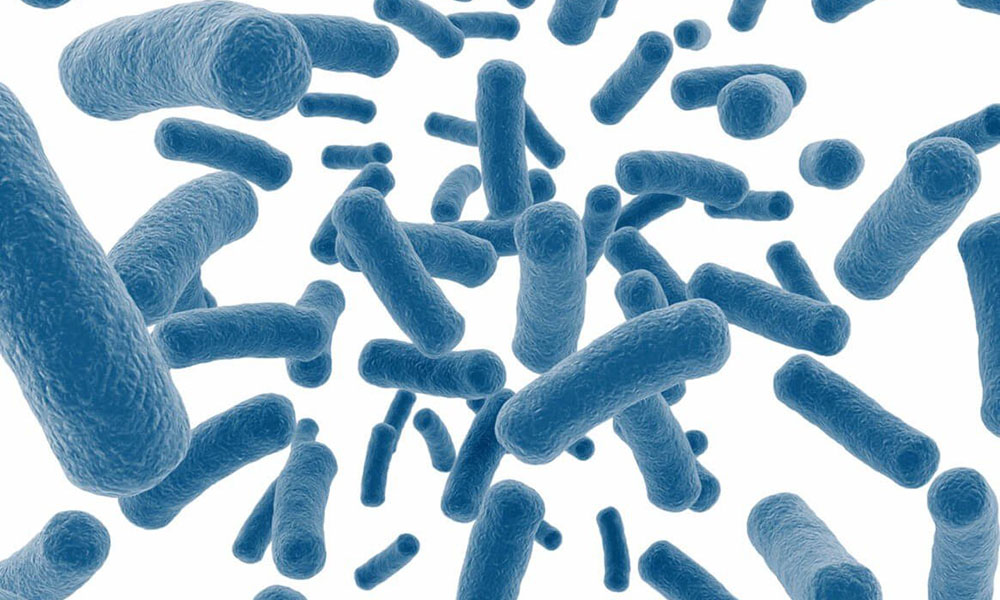
Just as your “pre-workout” routine lays the foundation for a productive workout, prebiotics lay the foundation for the production of probiotic bacteria in your body. Why is that important? Because probiotic bacteria help maintain a proper balance of “good” and “bad” bacteria in your gut (1). And that balance is essential if you’re to efficiently and effectively process the food you eat and stave off a number of vexing health issues.
One of the many good things about prebiotics is that, while they present a lot of potential upside, they have virtually no downside. So taking them is about as close as you can come to a “no-lose” situation.
That said, here are the 10 best prebiotic supplements on the market today.
1. Zenwise Health Digestive Enzymes Plus Prebiotics
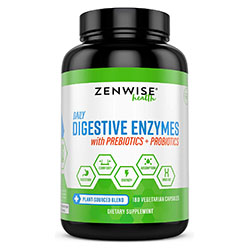
Zenwise Enzymes Plus Prebiotics is specially formulated to support healthy gut flora while at the same time preventing some of the side effects that can accompany prebiotic supplements, such a bloating and gas. In addition, Zenwise provides 1 billion CFU of probiotics such as L-plantarum and L-salivarius.
They join forces with the heathy bacteria being fed by the prebiotics to create a robust microbiome that makes the most of every last nutrient in the food you eat. Zenwise prebiotics also help you digest a multitude of otherwise difficult fats, gluten and cellulose. To top things off there a no artificial ingredients, no GMOs, they’re produced in a Good Manufacturing Practices (GMP) facility and they’re safe for the entire family.
2. Garden of Life Organic Fiber Prebiotic
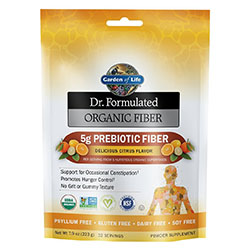
Garden of Life is a brand with a long track record of producing high-quality supplements. Their Organic Fiber Prebiotic powder is another feather in their cap. It’s formulated to feed the healthy bacteria in your gut while at the same time promoting regularity and helping to stabilize blood glucose levels.
Garden of Life are careful about the sources of their prebiotic fiber, choosing apple, orange, cranberry and acacia which are known to rein in hunger while providing a pleasing flavor when mixed with your favorite non-carbonated beverage. You’ll get relief from constipation and more effective nutrient absorption while at the same time enjoying mild appetite suppressant benefits. A good prebiotic for those on a diet.
3. Prebiotin Prebiotic Powder
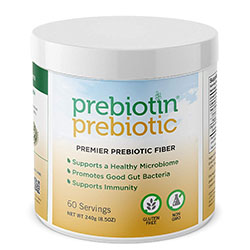
Prebiotin Prebiotic Fiber is another prebiotic powder that you mix with your favorite non-carbonated beverage. It makes a great addition to your protein shake or it can be mixed with plain water to help get your day off on the right foot.
This is a full-spectrum prebiotic formula that nourishes a healthy microbiome and supports regular elimination and effective nutrient absorption. Prebiotin Prebiotic powder in completely free of genetically modified organisms (2), gluten or artificial ingredients. If there is a downside here it’s a minor one in that the powder is packaged in a facility that also packages nut and soy products. So if you have a sensitivity to either of them you may want to take a pass. For everyone else though it’s a solid choice.
4. Hyperbiotics Organic Prebiotic Powder
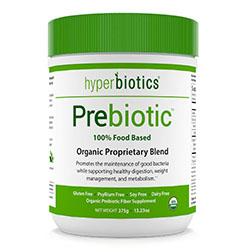
Hyperbiotics Organic Prebiotic Powder combines organic acacia fiber, Jerusalem artichoke fiber and green banana flour in a potent formula that will return your gut to the efficient nutrient absorption machine nature intended it to be. Hyperbiotics prebiotic fibers are ideally suited to restore the balance of bacterial flora in your gut and return you to a state of better overall health.
This particular powder is formulated with sensitive stomachs in mind and is unlikely to produce any of the minor side effects people will sometimes experience with prebiotics. Mix it with water, iced tea or your pre-workout protein shake to help ensure your internal engine is firing on all cylinders all day long.
5. BioSchwartz Prebiotics for Advanced Gut Health
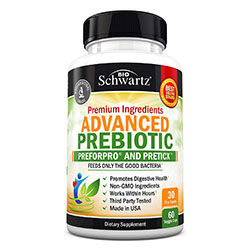
BioSchwartz prebiotic veggie caps are produced under the strictest quality control standards in a Good Manufacturing Practices-certified facility. They’re gleaned from the highest quality prebiotic sources and contain no soy, gluten, wheat, peanuts, sugar, artificial fillers, colors or flavor enhancers. BioSchwartz subjects all their supplements to rigorous 3rd party testing to ensure purity and potency.
They work quickly, work effectively and won’t saddle you with the kind of side effects you may experience from lesser prebiotic supplements. If you’re interested in seeing how your system is supposed to work, give prebiotics a try. If you don’t want to be bothered trying to find things to mix your prebiotic powder with give BioSchwartz gelcaps a try.
6. Solimo Prebiotic & Probiotic
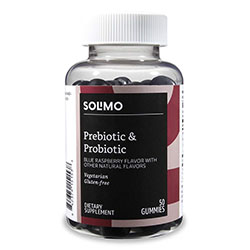
Solimo combines the nurturing power of prebiotics with a healthy dose of fully formed probiotics to help facilitate gut health and get you back on the road to good health. Their prebiotic/probiotic formula is delivered in a tasty gummy form thats great for the entire family.
Each soft chewable supplement contains a wealth of beneficial prebiotics to promote proper bacterial balance and 2 billion CFU (3) of probiotics to bolster nutrient absorption and get things moving along inside. These gummies are gluten free, soy free, dairy free and contain no artificial ingredients. Although they do add a couple of juice concentrates for flavoring purposes. Each bottle of Solimo Prebiotic & Probiotic provides a 25 day supply and comes with a 1 year money back guarantee.
7. Dr Tobias Prebiotic
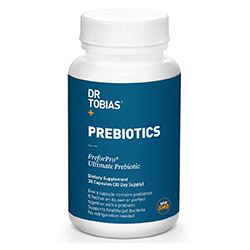
Dr. Tobias approaches gut health from a different direction than most other supplement makers. Instead of simply bombarding your system with prebiotic fibers the good doctor’s formula targets and eliminates bad bacteria in your gut.
This in turn clears the way for the formation of more healthy probiotic bacteria. Of course, there is also a significant dose of prebiotics that get to work in the newly cleansed gut providing nutrients to the expanding probiotic colonies. It’s a holistic approach to gut health and one that most people find quite effective. All Dr. Tobias supplements are free of GMOs and produced in a GMP facility under the watchful eye of the FDA. So you can always be assured of quality and potency.
8. vH Essentials Probiotics with Prebiotics
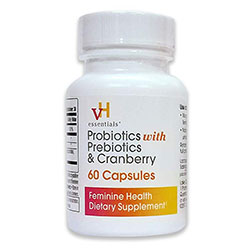
While vH Essentials Probiotics with Prebiotics is formulated with women in mind there’s nothing here that excludes guys from using it as well. The cranberry they include in their formulation is intended to bolster feminine hygiene while the potent mix of prebiotics and probiotics restores and maintains a healthy gut microbiome.
While we applaud vH Essentials for providing a supplement that caters to the particular needs of women, we’d be remiss if we didn’t mention that the lack of fiber-based prebiotics here means the product is not quite as effective as it might otherwise be. Still, there’s plenty to like and it’s one of the few supplements on the market that’s attempting to address the complex nature of women’s internal health in a comprehensive fashion.
9. Irwin Naturals Prebiotics
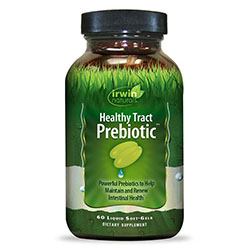
Irwin Naturals Prebiotics takes an “everything but the kitchen sink” approach to gut health. They scoured the prebiotic landscape and came up with a variety of sources including Jerusalem artichoke, yacon root, cumin, marshmallow extract (!), cardamon powder and more. It’s a potent mix designed to cover all the nutritional needs of those hungry, hungry probiotics in your gut.
Irwin presents their prebiotics in an easy to swallow, easy to digest softgel form that releases its contents quickly so they can get to work re-establishing order in your gut. Be aware however, that while the ingredients included here are indeed natural one of them is soy. So if you have a dietary sensitivity to that ingredient you might want to look elsewhere for you prebiotic supplement.
10. PinnacleLife Olivamine DigestiveHealth Prebiotic
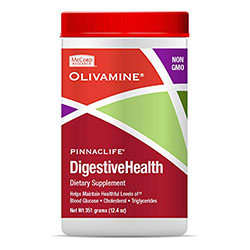
The final item on our list of best prebiotic supplements comes to us from PinnacleLife. This is another powdered supplement intended to be mixed with your favorite non-carbonated beverage. Each scoop contains 11 grams of soluble fiber that passes through your stomach directly into your digestive tract.
There, some of it offers itself up as food to the probiotic bacteria while the rest of it gets to work helping to move things through. There’s no sugar, artificial sweeteners or colors, no dairy, egg or soy. And no GMOs, gluten, fish or yeast. Just high-quality, high potency prebiotic fiber that will help return your insides to their normal, healthy state in short order.
FAQs
What are Prebiotics?
The term “prebiotic” covers any nutrient that plays a role in promoting probiotic growth. Probiotics are bacteria that aid in digestion. So promoting the growth of more probiotic bacteria should, in theory, enable your system to process food more efficiently and effectively, leading of course to a higher degree of overall health. The prebiotic family (4) is composed almost entirely of different types of fiber which resist being broken down in the stomach and pass into the intestine essentially unharmed. There, they serve as food for probiotic bacteria, enabling them to thrive and enhancing their ability to absorb nutrients.
So, Prebiotics are not Probiotics?
No, they’re not. They help your body produce probiotics but they are not the same thing. Prebiotics are more like fertilizer for probiotics. But just to make things really confusing for people many prebiotic supplements also include probiotic bacterial cultures. Here’s how you tell what kind of supplement you’re dealing with. If its purpose is to deliver live bacteria to your system then it’s a probiotic supplement. If the goal of the supplement is to provide nutrients the body can use to promote bacterial growth, then it’s a prebiotic.
What Are the Benefits of Taking Prebiotics?
As you may have guessed by now it’s impossible to discuss the benefits of prebiotics without also discussing the benefits of probiotics. The two are inextricably linked. So you’re going to hear both words a lot during this discussion of prebiotic benefits. Now that we have that out of the way let’s look at some of those benefits.
- Better Digestion – This is one of the primary reasons people take prebiotics. There are 10s of millions of people in the US alone who suffer from digestive disorders. In fact, it’s estimated that more than 60 million Americans suffer from chronic constipation (5). And while constipation in and of itself may not seem like such a big deal it can have a cascading effect that leads to hemorrhoids, loss of appetite, headaches and more (6). By taking prebiotics you promote the growth of those probiotics we keep talking about and they are what fends off, and in some cases alleviates, digestive problems.
- Enhanced Immune Function – Although it’s not a widely known fact the GI system actually plays a central role in the maintenance of a health immune system (7). (Here’s another little known fact: the word “probiotic” is actually a Greek word meaning “to promote life”.) But factors such as frequent antibiotic use can lead to a reduction in probiotic levels. As can a stressful lifestyle, low fiber intake and excess ingestion of refined sugar and more. Taking prebiotics helps offset these factors and promotes the production and maintenance of a healthy probiotic population. That, in turn, promotes a robust immune system.
- More Effective Nutrient Absorption – As we’ve discussed, prebiotics serve as food for beneficial probiotic bacteria, bolstering their numbers. With a healthy balance of good and bad bacteria in the gut our bodies can get back to the business of properly digesting the food we eat. This has a knock-on effect with every aspect of our physiology. For instance, studies show that probiotics can lead to better absorption of calcium and magnesium (8). That, in turn, means better bone health, reduced risk of osteoporosis and an enhanced ability to deal with stress. While more effective absorption of B vitamins enhances nervous system function and enables more efficient energy production.
- Weight Loss – With weight loss and prebiotics we’re treading on somewhat shaky ground. You see, while the internet is straining at the seams these days with articles claiming that pre and probiotics can help you attain meaningful weight loss, the clinical data suggests any effect is pretty modest (9). And while modest is better than non-existent it’s still modest and should be understood as such. What prebiotics can do for those trying to lose weight, is ensure that as they drop those pounds they don’t suffer from the nutrient deficiencies that can often befall dieters. And that’s really important since the point of dieting is to attain better overall health.
- Stress Reduction – Most people tend to feel a bit queasy or tense in their stomach before giving a presentation or performing before a crowd. Although few give it much thought this phenomenon actually points to the close connection between your gut and your brain (10). And, by extension, between gut health and things like anxiety and stress. By taking prebiotic supplements you help promote a healthier gut which in turn helps balance the relationship between body and mind, reducing stress and perhaps alleviating some of those butterflies you experience before a big event.
- A Natural Detox – Most people who avail themselves of a colon cleanse aren’t aware that prebiotics are one of the most important components of that process. That’s because the prebiotic family is comprised almost entirely of various types of fiber. Fiber not only promotes the growth of beneficial probiotics it also promotes regularity, which is one of the primary goals of any effective colon cleanse detox regimen.
- Reduced Inflammation – Inflammation is at the heart of a spate of chronic diseases, including diabetes, obesity, heart disease, arthritis and some forms of cancer. Because prebiotics contribute to more effective metabolic processes researchers are beginning to think that they may also help in fending off the unnecessary immune system reactions that lead to inflammation (11). It’s still early, and more extensive research needs to be done, but the initial result are encouraging.
- Reduced Risk of Heart Disease – We just alluded to this benefit in the previous bullet point but it’s important enough to warrant its own entry on this list. Evidence suggests that prebiotics actually eat the type of cholesterol associated with elevated risk of heart disease (12). The mechanisms by which it accomplishes that laudable feat are not completely understood as of this writing. But the evidence is there and compelling enough to warrant further investigation.
Are Prebiotics Good for Losing Weight?
We touched on this earlier and the answer is both yes and no. There is some evidence that prebiotics and probiotics may help some obese individuals lose a modest amount of weight. However, anyone thinking that prebiotic supplements are like the keto diet in a pill form is fooling themselves. That’s not to say they can’t be beneficial to those on a weight loss program. They can. What they’ll do instead of burning fat is help ensure your body is making optimal use of the limited amount of food you are eating while you diet. And that’s a benefit that can’t be overstated.
Do Prebiotics Have Any Side Effects?
We said at the outset that prebiotics have virtually no downside. And for the overwhelming majority of people that is absolutely true. However, there are exceptions to every rule and in the spirit of full disclosure it’s necessary to take stock of the possible side effects a limited number of individuals may experience when taking prebiotic supplements or eating a diet rich in prebiotic foods. So here are those potential side effects.
- Abdominal bloating – Most prebiotics are some form of fiber and some forms of fiber are known to absorb water. As a result some people may experience abdominal bloating from taking prebiotics. In addition, it’s possible these same persons may experience gas from taking prebiotics, or eating prebiotic rich foods. It’s also possible that the combination of all this intestinal gas and bloating could produce lower abdominal pain.
- Growth of bad intestinal bacteria – “What? I thought prebiotics promoted the growth of only good intestinal bacteria?” That’s true. They do. However, not everyone who takes prebiotic supplements is careful to read things like expiration dates. In addition, not all prebiotic supplements are created equal. Some are produced by scam artists out for nothing more than to cash in on the latest health craze. They just cobble together whatever is available and slap a label on it. Sometimes, what they sell is contaminated with fungi or other pathogens that cause a spike in the production of bad bacteria. Because of this it’s important that you only purchase the type of proven, high quality prebiotics listed above.
- Aggravation of pre-existing conditions – As is usually the case when we talk about someone taking prebiotics we’re assuming the person doing so is in generally good health. However, not everyone is. So if you suffer from an existing autoimmune condition you should be aware that your body may misinterpret the presence of prebiotics and/or the probiotics they produce as being unhealthy and react to them in an unexpected and harmful ways (13). Therefore it is highly recommended that if your immune system is compromised in any fashion that you discuss prebiotic supplementation with your doctor before proceeding.
The Bottom Line
Prebiotics are a simple way to enhance your overall health. By promoting the growth of beneficial bacteria they enable more effective nutrient absorption, detoxify your system and can actually reduce levels of stress and anxiety. In addition, there’s evidence that they can reduce the risk of heart attacks by actually eating cholesterol. Any one of the prebiotic supplements in our list will help you enjoy these and other benefits. Just be sure to keep the above precautions in mind and discuss things with your doctor prior to taking them if you have any concerns.


1 Comment
Prebiotics: What Are They and How They Help With Digestion | Neighborhood Trainers · January 4, 2021 at 11:50 am
[…] of fruits and vegetables. Prebiotics are known as food that help all that lovely and healthy bacteria grow in your gut making your digestive system function […]